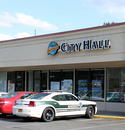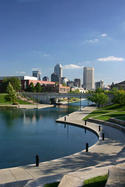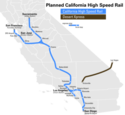Much is said about class warfare in contemporary America, and there’s justifiable anger at the impoverishment of much of the middle and working classes. The Pew Research Center recently dubbed the 2000s a “lost decade” for middle-income earners — some 85% of Americans in that category feel it’s now more difficult to maintain their standard of living than at the beginning of the millennium, according to a Pew survey. read more »
Politics
New Setbacks for the Beleaguered California Bullet Train
A proposal by Senator Michael Rubio (SB 317) to loosen California's landmark environmental protection law commonly known as CEQA, has been shelved. The proposed legislation was intended to exempt the Central Valley rail construction project from CEQA requirements, thereby removing the threat of environmental litigation against the project. read more »
Regionalism: Spreading the Fiscal Irresponsibility
Stanley Kurtz's new book, Spreading the Wealth: How Obama is Robbing the Suburbs to Pay for the Cities describes political forces closely tied to President Obama who have pursued an agenda to "destroy" the suburbs for many years. read more »
Utah Up, Chicago Down: Why Mitt Romney Should Embrace His Mormonism
In his run for the Republican nomination, Mitt Romney downplayed his Mormonism—referring only to “faith” or “shared values”—in the face of small-minded members of the Christian right and the occasional cackle from the Eastern cultural avant-garde. read more »
Form Follows Zoning
When Louis Sullivan, purveyor of modern American high-rise architecture, said more than 100 years ago that ‘Form Follows Function’, he perhaps didn’t realize the extent to which building form would not be determined only by building type and the laws of physics, but by zoning laws, building safety codes, real estate developer balance sheets and even vocal neighborhood groups. read more »
Is California the New Detroit?
Most Californians live within miles of its majestic coastline – for good reason. The California coastline is blessed with arguably the most desirable climate on Earth, magnificent beaches, a backdrop of snow-capped mountains, and natural harbors in San Diego and San Francisco. The Golden State was aptly named. Its Gold Rush of 1849 was followed a century later by massive post-war growth. read more »
The Screwed Election: Wall Street Can’t Lose, and America Can’t Win
About two in three Americans do not think what’s good for Wall Street is good for America, according to the 2012 Harris poll, but do think people who work there are less “honest and moral than other people,” and don’t “deserve to make the kind of money they earn.” Confidence in banks is at a record low, read more »
Why I Don’t Live In Indianapolis
It’s no secret that Indianapolis has been a huge focus of my blog over the years. One of the biggest criticisms I get here, especially when I ding some other city, is that I’m nothing more than a mindless booster for Indy. While I like to think I’ve given the city a lot of tough love over the years, it’s definitely true that I’ve had many, many good things to say, and I have no problem saying that I’m a big fan of the city overall.
Why then, might one ask, don’t I actually live in Indianapolis? read more »
Swing State Geography: The I-4 Corridor
Overheated presidential politics have done few favors to Florida, except to put 132 miles of hot asphalt on everyone’s lips: Interstate 4. Completed in the late 1960s, this interstate (in fact, the only interstate highway to be entirely contained within one state) is known by millions who have visited there at least once on vacation. But the social and political reality in the world around Interstate 4 is little known outside of Central Florida. Like Ypres, the Flemish town continually under assault during World War 1, I-4 will receive the brunt of both side’ read more »
The Uncertain Future of the California Bullet Train
On July 18, at a site pregnant with symbolism — the future location of what HSR advocates hope will become San Francisco’s terminus of the state’s bullet train — California Gov. Jerry Brown signed a bill to fund construction of the first section of the high-speed line. Earlier in the day, Brown had traveled for a similar ceremony to Los Angeles, the other "bookend" of the project. read more »
- Login to post comments






















